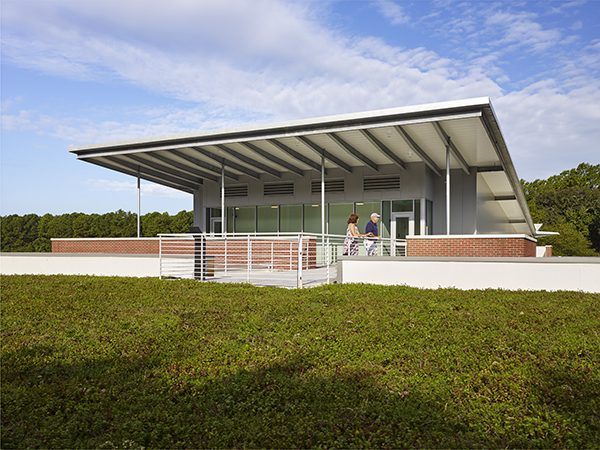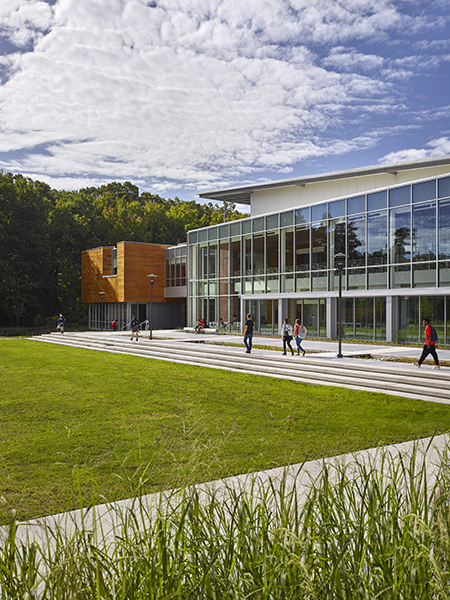Share this Story
VWU Recognized Nationally Among Most Environmentally Responsible Universities
Featured in The Princeton Review Guide to 399 Green Colleges
 University News | October 27, 2018
University News | October 27, 2018
Òùµ´ÉÙ¸¾ is one of the 399 most environmentally responsible colleges in the nation, according to The Princeton Review. The education services company known for its college rankings features VWU in the 2018 edition of its book, The Princeton Review Guide to 399 Green Colleges.
Schools were chosen for the ninth annual edition of this "green guide" based on data from the company's 2017-18 survey of hundreds of four-year colleges concerning the schools' commitments to the environment and sustainability.
"We strongly recommend Òùµ´ÉÙ¸¾ and the other fine colleges in this guide to the many environmentally-minded students who seek to study and live at green colleges," said The Princeton Review's Editor-in-chief Robert Franek.
Franek noted that college applicants and their parents are increasingly concerned about the environment and sustainability issues. Among nearly 11,000 teens and parents The Princeton Review surveyed earlier this year for its 2018 "College Hopes & Worries Survey," 63 percent overall said having information about a college's commitment to the environment would influence their decision to apply to or attend the school.
Colleges were chosen for the Guide to 399 Green Colleges based on "Green Rating" scores the The Princeton Review tallied in summer 2018 for 648 colleges using data from its survey of administrators at the colleges in 2017-18. The survey asked them to report on their school's sustainability-related policies, practices, and programs. More than 25 data points were weighted in the tallies for the Green Rating score which was done on a scale of 60 to 99. Colleges with Green Rating scores of 80 or higher made it into the guide.
 The Òùµ´ÉÙ¸¾ community is dedicated to a greener campus and a greener world. In addition to its consistent selection for The Princeton Review's green colleges guide, VWU has been recognized locally, regionally and nationally for its sustainability practices:
The Òùµ´ÉÙ¸¾ community is dedicated to a greener campus and a greener world. In addition to its consistent selection for The Princeton Review's green colleges guide, VWU has been recognized locally, regionally and nationally for its sustainability practices:
- Opened the LEED Gold certified in fall 2017, offering unprecedented opportunities for students through its indoor and outdoor classroom spaces and teaching and research laboratories, and fostering collaboration with like-minded organizations such as the Virginia Aquarium and Marine Science Center and the Chesapeake Bay Foundation’s Brock Environmental Center.
- Also in 2017, launched the , a highly-selective program aiming to educate impactful global citizens through an environmental focus, an international study-away experience, and leadership training and development.
- Honored by the Chesapeake Bay Foundation in 2018 with its top "" award, which recognizes the Greer Environmental Sciences Center and the University’s vision and dedication to educating the next generation of Bay leaders.
- Recently advanced to the top tier Model Level status in the Elizabeth River Project’s River Star Business program.
- Installed a SmartFlower solar system on campus, which generates 40 percent more energy than a traditional fixed solar panel.
- In summer 2018, hosted the Environmental Explorers camp in partnership with the YMCA of South Hampton Roads’ Camp Red Feather and the for ninth-grade girls interested in in E-STEM fields.
- A participant in the partnership, a coalition dedicated to helping recover the Bay’s oyster populations, and a member of Virginia’s No Child Left Inside Coalition, a collaborative effort between organizations to promote outdoor learning.
- Selected by the program to receive funding for two solar-powered umbrellas and two human-powered desk bicycles that function on campus as sustainable cell-phone charging stations for students.
In addition, VWU President Scott D. Miller serves as chair of The Climate Leadership Network (formerly The American College and University Presidents Climate Commitment) and sits on the board of the prominent national environmental advocacy organization Second Nature. He leads the President's Environmental Issues Council on campus and recently declared October 5 as Energy Efficiency Day at Òùµ´ÉÙ¸¾.
“Our current and prospective students in environmental studies represent a real hope in those disciplines for all of us,” said Dr. Miller. “They have embraced the cause of a cleaner, healthier environment that will enrich our lives, and the lives of generations to come, in Coastal Virginia and throughout the world.”


